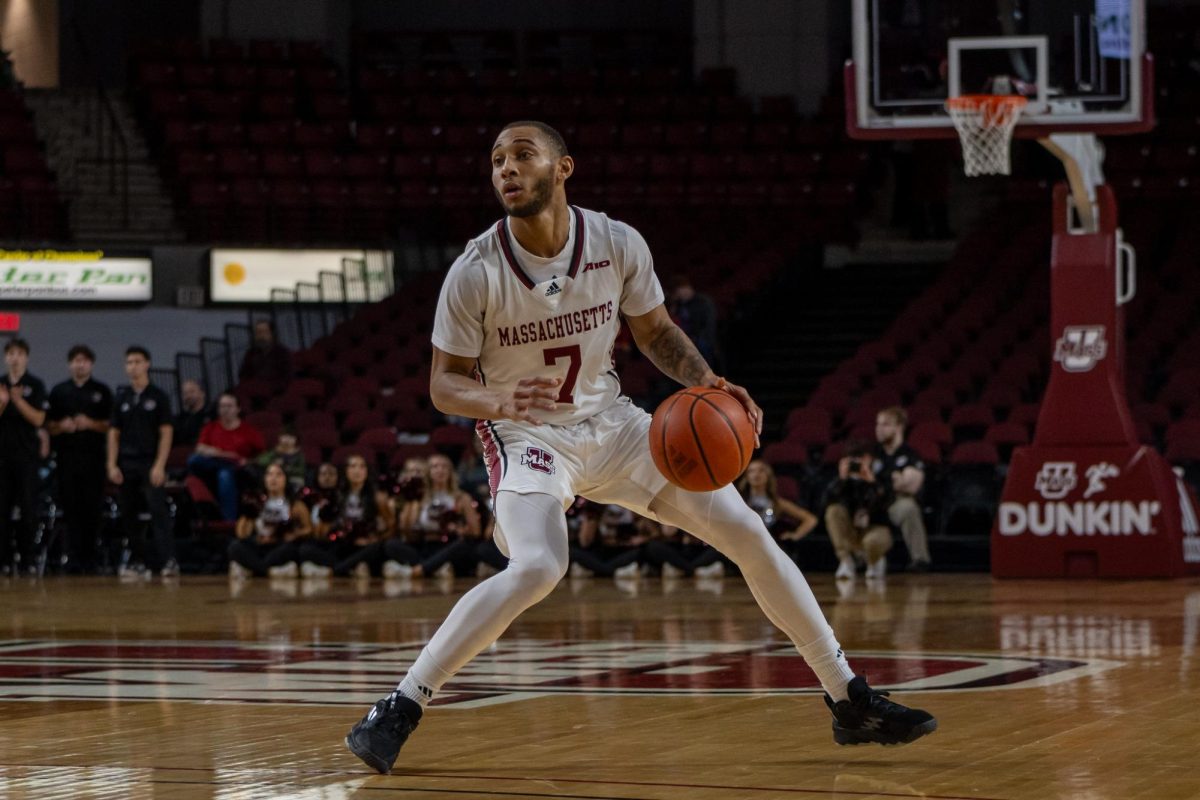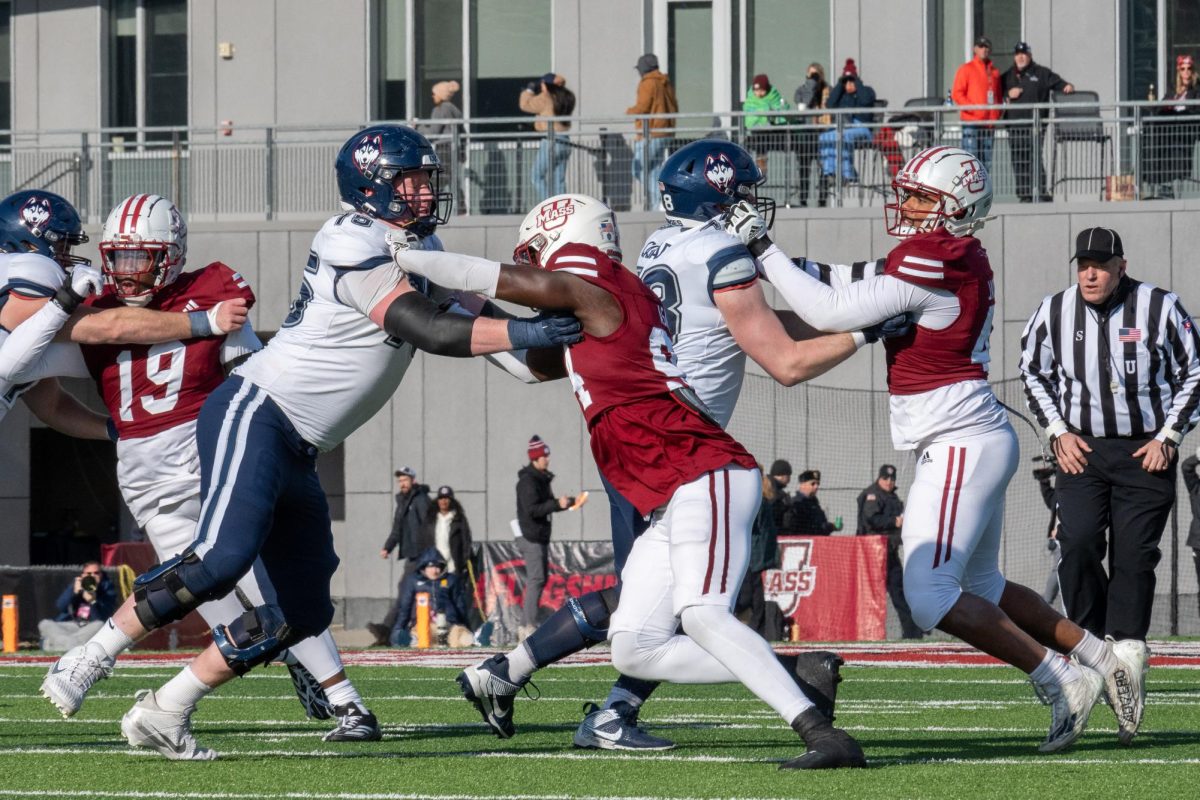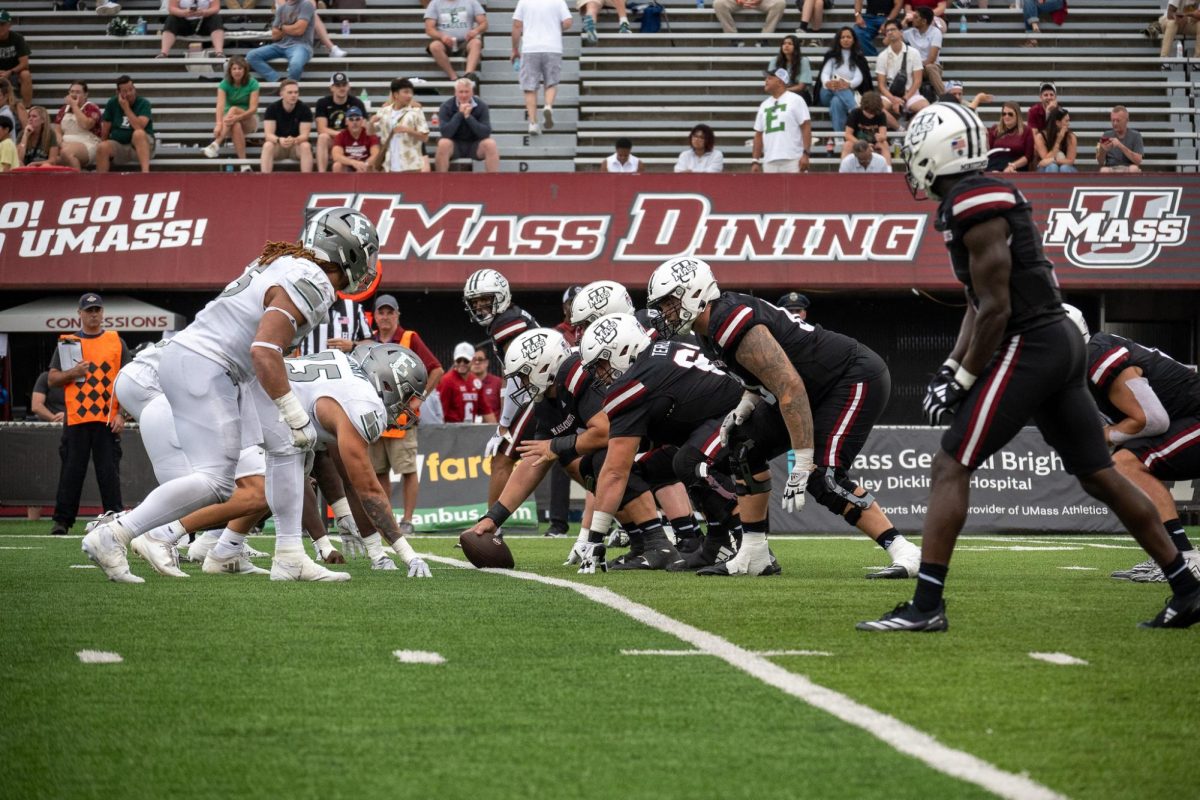The Arab Students Club and the University of Massachusetts Palestinian Action Coalition co-sponsored a teach-in last night in the Campus Center called “The Palestinian Struggle: Popular Resistance, U.S. Foreign Policy, and the Media.”
The event was well-attended, with a standing-room-only audience that struggled to cram inside Campus Center Room 904 to listen to the night’s featured speakers: Bushra Mohammed, a slam poet who writes about Palestinian political issues; Mazin Qumsiyeh, a political activist and an Assistant Professor at Yale University; and Anthony Arnove, an activist with the International Socialist Organization.
The event would become emotionally charged and conflicted as the night drew on, and as one opinion after another clashed with opposition in the room.
The difficulty of maintaining peaceable discussion appeared to be an issue from the very beginning, when Alicia Klein, of the Arab Students Club, introduced the event with the caution that “we’d like to keep the questions tonight questions, not statements.
“Also, please keep them to 60 seconds in length at the longest, and let the speakers answer them fully.”
Tension was already high as Mohammed began to read. There were visible reactions among members of the audience to lines such as “we now, the new Wandering Jew,” in reference to Palestinian refugees. Finally, before her selection “Liberation from a Freedom Fighter,” Mohammed said to the audience, “I want you all to keep in mind that I am a poet. I write from my heart. You want objectivity? Go home and watch CNN.”
Even this statement was met with debate. “CNN isn’t objective!” an unidentified audience member yelled back.
“Well, then, if you want to hear what you want to hear watch CNN,” Mohammed replied. “Maybe you can be rocked to sleep by their lulla-lies.”
Qumsiyeh took the microphone next. He discussed his personal experiences growing up on the West Bank, and wove in his own perspective on Israeli-Palestinian history. He said that before 1967, “I didn’t know much about Judaism or Jews or what their thoughts were.
“But in that year, as the Israelis took over the West Bank, I saw soldiers and I saw fear.”
Someone in the audience shouted, “what happened in 1947 and 1948?”
“In 1948 they had a much more horrific experience with Israeli soldiers,” Qumsiyeh said. “During that year 531 Palestinian villages were repopulated. The majority of people, even according to Israeli historians, left while the area was still under British mandate, but they still left ‘under the gun,’ so to speak, in a method which we would call ethnic cleansing. Israel simply loaded them on buses and told them to leave.”
Qumsiyeh said that the goal of the original British design for a Jewish state included Palestinian citizens, but that Palestinian leaders “rejected this for good reason, and many Jews in Palestine also opposed this action.” He likened it to “a jailer giving you control over your own affairs while keeping the keys.”
Qumsiyeh said that his anger at Israeli occupation was not aimed solely at Jews. He said that the British had had much to do with the creation of Israel. “In Palestine we all lived together peacefully, not just Muslims,” he said. “Muslims, Jews, and Christians. The problem began when the British called for the creation of a Zionist state.”
Nor, Qumsiyeh said, was his outrage at what he termed “a catastrophic situation” in the West Bank region directed at all those of Jewish nationality.
“I remember in 1967, my grandfather received a visitor at his house and I happened to be there,” Qumsiyeh recalled. “It was an elderly Jewish gentleman, a high school friend of my grandfather’s, and I just remember these two old gentlemen, one Israeli, one Palestinian, crying on each other’s shoulders.
“I’ve always kept in mind the difference between this Jewish gentleman, who was a best friend to my grandfather, and the Israeli soldiers who were invading us.”
Qumsiyeh also pointed to the media and what he termed skewed or fabricated accounts of international events for the continued conflict in the Middle East. He said that there is an imbalance in which regions of the Israeli-Palestinian territory get coverage.
“These bombings aren’t happening in Tel-Aviv,” he claimed. “They’re happening on the West Bank and the Gaza Strip, in occupied areas, where 400 Jewish settlers in Hebron control the lives of 100,000 Palestinian refugees.”
These comments were met with outspoken disagreement from several members of the audience. Klein stood and reminded them to save questions for after the speakers had finished.
“The media doesn’t really tell you what is happening,” Qumsiyeh continued. He gave a list of websites, including www.intifada.org, and www.palestineremembered.org, as “good sources that debunk Zionist myths.” Again, there was visible and audible unrest in the crowd.
The emotionally charged talks continued with Arnove’s speech concerning what he termed “The US relationship to Israel and our responsibility for some of the crimes against humanity that [Qumsiyeh] just described.”
According to Arnove, United States financial and military aid “has allowed Israel to carry out immense human rights abuses.”
He also said he felt that this aid has been excessive.
“If you look at it per capita, it’s off the charts,” he said. “And if you look at it politically it’s all a means for Israel to continue systematically violate Palestinian human rights.”
Arnove described the conditions in Palestine, which he visited last year, as “horrific and untenable,” likening the situation to that of apartheid South Africa.
He then explored the origins of the US-Israeli alliance. Citing the United States’ “horrible historical record when it comes to protecting the rights of Jews,” Arnove moved argued that for the United States the alliance “is a purely strategic and cynical one,” aimed mostly at controlling oil production in the region and, as he put it, “punishing other states for contradicting US interests in the area.”
“Israel doesn’t have oil!” came a protest.
“Yes, yes, Israel doesn’t have oil,” Arnove replied. “But use your intelligence. Israel serves US interests in a region that has a lot of oil.” He quoted an article from Newsweek to support his point, and then commented, “at least Newsweek seems to think so. You think what you want.”
According to Arnove, US taxpayers should address the issue of US aid to Israel.
“We need to tell the government that we know that the US interests in this region are at odds with the interests of those who live there in immense poverty,” Arnove said. “It’s an area of tremendous disparity and desperation. It’s a volatile and dangerous equation.”
He said that the current war in Afghanistan was part and parcel of the East-West conflict that has engulfed Palestine and Israel.
“It’s threatening to further destabilize the region,” Arnove said of the war, “and it’s being taken advantage of by other states, including Israel and I think that we need to involve Palestine in protesting against this war. We have to talk long term here like President Bush is doing, about the situation in the Middle East and around the world. Our political system today is unsustainable; we need a new world order based on cooperation and peace.”
Mohammed then closed the event with three more poetry selections, ending her reading in tears.
Audience member Aura Spivak, a Senior Women’s Studies and English Major, said that she was “stung” by what the featured lecturers had to say. She took particular exception to Qumsiyeh’s claim that there were no bombings going on in Tel Aviv, and Arnov’s characterization of Israeli leader Ariel Sharon as “a mass murderer” during his talk.
She said that the speakers were “obviously very educated people, so I’m disappointed that they would skew events this way. I just don’t like it when only part of the truth is what’s given. Because part of the truth is basically a lie.”






